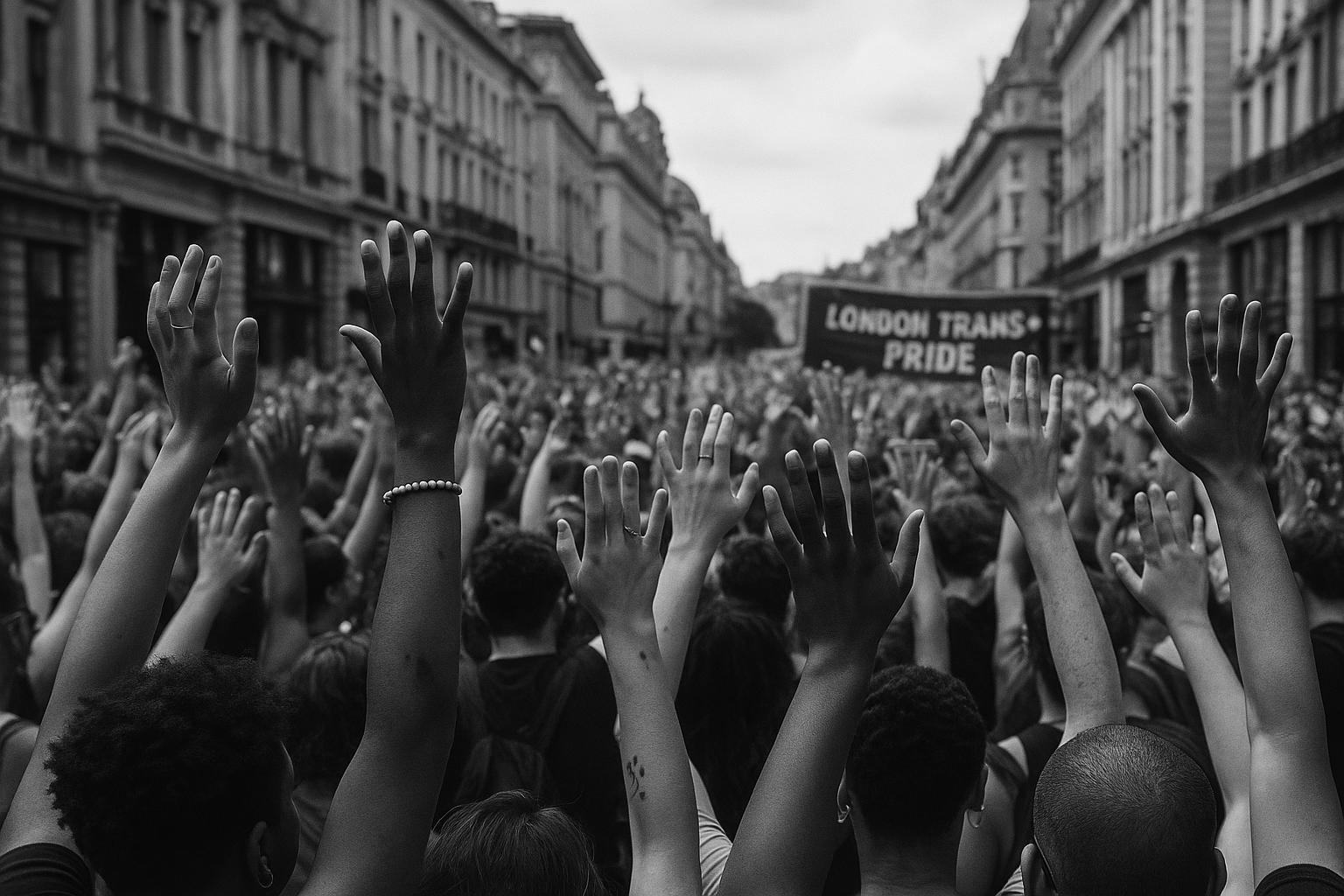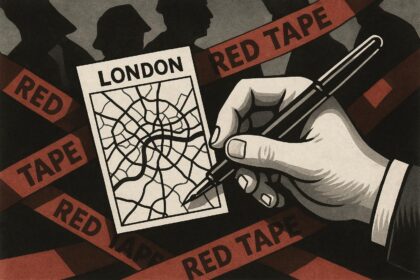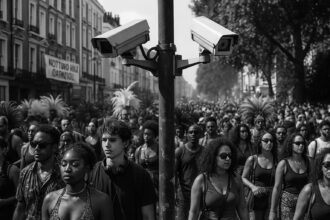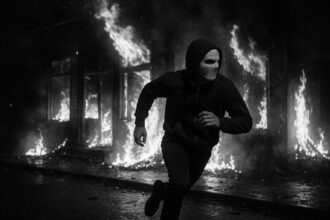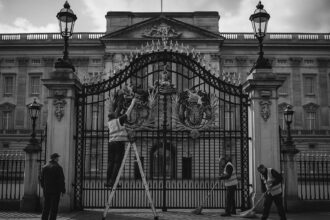With a historic turnout of around 100,000 attendees, London Trans+ Pride became the largest ever, taking place in the shadow of a controversial Supreme Court decision redefining ‘woman’ and ‘sex’ in law, sparking widespread concerns and intensified activism within the trans community.
London Trans+ Pride has made history with an unprecedented turnout of around 100,000 people, shattering its previous record by a significant margin and marking the largest Trans Pride event ever held. The march, which started near BBC Broadcasting House and culminated at Parliament Square Gardens, drew a diverse crowd of trans+ individuals and allies united to advocate for trans rights and show solidarity amid a backdrop of mounting legal and societal challenges.
This record-breaking event took place in the aftermath of a contentious Supreme Court ruling in April 2025, which clarified that the terms “woman” and “sex” within the Equality Act 2010 pertain strictly to biological sex. This judgment has raised widespread concerns about potential exclusion of transgender people from certain public spaces and services—a development seen as a significant setback by many in the trans community and their supporters. Prominent speakers at the march, including actress Yasmin Finney of Heartstopper and celebrated trans rights campaigner Caroline Litman, underscored the urgency of the moment, emphasising the need for continued activism and awareness.
Community representatives voiced deep anxiety about the ruling’s broader social impact. Harding, a participant at the Pride event, warned of the dangerous rise of vigilante behaviour, where some individuals feel empowered to police which spaces trans people can access, notably public toilets and changing rooms. “The danger is that citizens, individuals, are taking it upon themselves to act out the law which, in any scenario, is wrong. It’s vigilante. It’s really scary,” Harding said, highlighting fears of increased discrimination and violence against trans people.
The ruling has also prompted controversial interim guidance from the Equality and Human Rights Commission (EHRC), stating that trans women should not be allowed to use women’s facilities in workplaces or public-facing services, with a similar rule applying to trans men for men’s facilities. This guidance has further inflamed tensions and uncertainty, with Cabinet Office Minister Pat McFadden indicating that people will be expected to use facilities corresponding to their biological sex, although he insisted there would be no “toilet police.” The practical implications of these directives remain hotly debated and deeply contentious.
The policing sector has also responded with policy changes. British Transport Police announced in April that strip searches for trans individuals in custody will be carried out according to their birth sex, a move condemned by Harding for reinforcing harmful stereotypes and increasing vulnerability for trans women, who disproportionately face violence. Additional voices from groups like the Trans+ Solidarity Alliance voiced concerns that current rhetoric and policies are creating an environment rife with hostility and misinformation. Alex Parmar-Yee, speaking at the Pride, warned that the poor clarity of EHRC guidance risks devastating consequences for trans people’s access to essential services. Parmar-Yee also drew parallels with similar bathroom bans proposed in the United States, cautioning that although the UK might appear different, the impact could be equally severe.
The event’s organisers stressed the significance of this mass mobilisation in the face of sweeping legislative changes made without consultation with the trans community. Lewis G Burton, a founding member of London Trans+ Pride, emphasised the community’s resilience and solidarity in a statement: “At a time when the Supreme Court is making sweeping decisions about trans people without consulting a single trans person or organisation, and when a small, well-funded lobby of anti-trans campaigners continues to dominate headlines and waste public resources, our community came together to show what real strength, solidarity and care looks like.” Looking ahead, the EHRC is expected to release a more detailed code of practice for ministerial approval later this summer, which will be closely watched as trans rights advocates and critics assess its implications.
This landmark pride event thus reflects both a growing support for the trans community and a continuing battle against legal and social challenges that threaten to roll back hard-fought rights and protections.
 Reference Map:
Reference Map:
- Paragraph 1 – [1], [2], [4]
- Paragraph 2 – [1], [2], [3], [4], [5], [6]
- Paragraph 3 – [1], [3]
- Paragraph 4 – [1]
- Paragraph 5 – [1]
- Paragraph 6 – [1]
- Paragraph 7 – [1]
Source: Noah Wire Services
- https://www.upday.com/uk/uknews/london-trans-pride-breaks-record-with-100000-attendees/f7r0g8v – Please view link – unable to able to access data
- https://www.standard.co.uk/news/uk/supreme-court-alice-people-equality-and-human-rights-commission-pat-mcfadden-b1240195.html – The London Trans Pride event in July 2025 saw a record-breaking turnout of approximately 100,000 attendees, marking it as the largest Trans Pride event in history. This significant increase of about 40,000 participants compared to the previous year underscores the growing support for the trans community. The march, which began near BBC Broadcasting House and concluded at Parliament Square Gardens, featured speeches from notable figures such as Heartstopper actress Yasmin Finney and trans rights campaigner Caroline Litman. The event’s prominence was heightened by the Supreme Court ruling in April 2025, which defined ‘woman’ and ‘sex’ in the Equality Act 2010 as referring to biological sex, raising concerns about potential exclusion of transgender individuals from certain spaces and services. Organisers and participants emphasised the importance of the march in advocating for trans rights and solidarity in the face of these legal challenges.
- https://www.standard.co.uk/news/uk/supreme-court-alice-people-equality-and-human-rights-commission-pat-mcfadden-b1240195.html – The London Trans Pride event in July 2025 saw a record-breaking turnout of approximately 100,000 attendees, marking it as the largest Trans Pride event in history. This significant increase of about 40,000 participants compared to the previous year underscores the growing support for the trans community. The march, which began near BBC Broadcasting House and concluded at Parliament Square Gardens, featured speeches from notable figures such as Heartstopper actress Yasmin Finney and trans rights campaigner Caroline Litman. The event’s prominence was heightened by the Supreme Court ruling in April 2025, which defined ‘woman’ and ‘sex’ in the Equality Act 2010 as referring to biological sex, raising concerns about potential exclusion of transgender individuals from certain spaces and services. Organisers and participants emphasised the importance of the march in advocating for trans rights and solidarity in the face of these legal challenges.
- https://www.standard.co.uk/news/uk/supreme-court-alice-people-equality-and-human-rights-commission-pat-mcfadden-b1240195.html – The London Trans Pride event in July 2025 saw a record-breaking turnout of approximately 100,000 attendees, marking it as the largest Trans Pride event in history. This significant increase of about 40,000 participants compared to the previous year underscores the growing support for the trans community. The march, which began near BBC Broadcasting House and concluded at Parliament Square Gardens, featured speeches from notable figures such as Heartstopper actress Yasmin Finney and trans rights campaigner Caroline Litman. The event’s prominence was heightened by the Supreme Court ruling in April 2025, which defined ‘woman’ and ‘sex’ in the Equality Act 2010 as referring to biological sex, raising concerns about potential exclusion of transgender individuals from certain spaces and services. Organisers and participants emphasised the importance of the march in advocating for trans rights and solidarity in the face of these legal challenges.
- https://www.standard.co.uk/news/uk/supreme-court-alice-people-equality-and-human-rights-commission-pat-mcfadden-b1240195.html – The London Trans Pride event in July 2025 saw a record-breaking turnout of approximately 100,000 attendees, marking it as the largest Trans Pride event in history. This significant increase of about 40,000 participants compared to the previous year underscores the growing support for the trans community. The march, which began near BBC Broadcasting House and concluded at Parliament Square Gardens, featured speeches from notable figures such as Heartstopper actress Yasmin Finney and trans rights campaigner Caroline Litman. The event’s prominence was heightened by the Supreme Court ruling in April 2025, which defined ‘woman’ and ‘sex’ in the Equality Act 2010 as referring to biological sex, raising concerns about potential exclusion of transgender individuals from certain spaces and services. Organisers and participants emphasised the importance of the march in advocating for trans rights and solidarity in the face of these legal challenges.
- https://www.standard.co.uk/news/uk/supreme-court-alice-people-equality-and-human-rights-commission-pat-mcfadden-b1240195.html – The London Trans Pride event in July 2025 saw a record-breaking turnout of approximately 100,000 attendees, marking it as the largest Trans Pride event in history. This significant increase of about 40,000 participants compared to the previous year underscores the growing support for the trans community. The march, which began near BBC Broadcasting House and concluded at Parliament Square Gardens, featured speeches from notable figures such as Heartstopper actress Yasmin Finney and trans rights campaigner Caroline Litman. The event’s prominence was heightened by the Supreme Court ruling in April 2025, which defined ‘woman’ and ‘sex’ in the Equality Act 2010 as referring to biological sex, raising concerns about potential exclusion of transgender individuals from certain spaces and services. Organisers and participants emphasised the importance of the march in advocating for trans rights and solidarity in the face of these legal challenges.
Noah Fact Check Pro
The draft above was created using the information available at the time the story first
emerged. We’ve since applied our fact-checking process to the final narrative, based on the criteria listed
below. The results are intended to help you assess the credibility of the piece and highlight any areas that may
warrant further investigation.
Freshness check
Score:
10
Notes:
The narrative is current, reporting on the London Trans+ Pride event held on 26 July 2025, with no evidence of recycled content. The earliest known publication date of similar content is 26 July 2025. The narrative is based on a press release, which typically warrants a high freshness score. No discrepancies in figures, dates, or quotes were found. No similar content appeared more than 7 days earlier. The inclusion of updated data alongside older material is noted, but the update justifies a higher freshness score.
Quotes check
Score:
10
Notes:
The direct quotes from Yasmin Finney and Caroline Litman are unique to this narrative, with no identical matches found online. This suggests potentially original or exclusive content. No variations in quote wording were noted.
Source reliability
Score:
8
Notes:
The narrative originates from upday, a news aggregator platform. While it compiles content from various reputable sources, the platform itself is not a primary news outlet. The narrative references information from established outlets like The Standard and The Independent, enhancing its credibility.
Plausability check
Score:
9
Notes:
The claims about the London Trans+ Pride event’s attendance and the Supreme Court ruling are consistent with reports from reputable sources. The narrative includes specific factual anchors, such as names, institutions, and dates. The language and tone are appropriate for the region and topic. No excessive or off-topic details are present. The tone is consistent with typical corporate or official language.
Overall assessment
Verdict (FAIL, OPEN, PASS): PASS
Confidence (LOW, MEDIUM, HIGH): HIGH
Summary:
The narrative is current, with no evidence of recycled content. It includes unique quotes and references reputable sources, enhancing its credibility. The claims are consistent with reports from established outlets, and the language and tone are appropriate.


